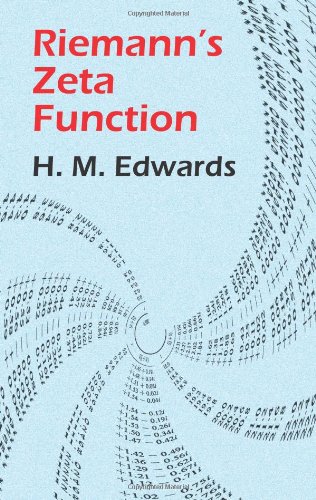Riemann's Zeta Function ebook download
Par patrick kerri le samedi, avril 30 2016, 10:16 - Lien permanent
Riemann's Zeta Function by H. M. Edwards


Download eBook
Riemann's Zeta Function H. M. Edwards ebook
Page: 331
Publisher: Academic Press Inc
ISBN: 0122327500, 9780122327506
Format: pdf
In this paper, we show that any polynomial of zeta or $L$-functions with some conditions has infinitely many complex zeros off the critical line. If we look at the Taylor expansion. After that brief hiatus, we return to the proof of Hardy's theorem that the Riemann zeta function has infinitely many zeros on the real line; probably best to go and brush up on part one first. The Riemann Hypothesis is not based on the Euler product." I disagree and let me explain why: Golden key is not Euler product. Riemann functional equation and Hamburger's theorem. For the Dirichlet series associated to f . \displaystyle \zeta(s) = \sum_{n=1}^. Observe at once that the Riemann zeta function is given by. In this post I shall give a proof of functional equation of Riemann zeta function by poisson summation formula and then a proof to a converse result. Contour integral representations of Riemann's Zeta function and Dirichlet's Eta (alternating Zeta) function are presented and investigated. This general result has abundant applications. The reflection functional equation for the Riemann zeta function is where and . So-defined because it puts the functional equation of the Riemann zeta function into the neat form $\xi(1-s) = \xi(s)$. But right in the middle there is a discussion of Bernhard Riemann's zeta function, which in my (albeit layman's understanding) is concerned with predicting the distribution of prime numbers. $$\xi(s) = (s-1) \pi^{-s/2} \Gamma\left(1+\tfrac{1}{2} s\right) \zeta(s),$$.